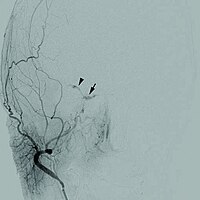
Photo from wikipedia
Background Sanguinate, a bovine PEGylated carboxyhemoglobin-based oxygen carrier with vasodilatory, oncotic and anti-inflammatory properties designed to release oxygen in hypoxic tissue, was tested to determine if it improves infarct volume,… Click to show full abstract
Background Sanguinate, a bovine PEGylated carboxyhemoglobin-based oxygen carrier with vasodilatory, oncotic and anti-inflammatory properties designed to release oxygen in hypoxic tissue, was tested to determine if it improves infarct volume, collateral recruitment and blood flow to the ischemic core in hyperacute middle cerebral artery occlusion (MCAO). Methods Under an IACUC approved protocol, 14 mongrel dogs underwent endovascular permanent MCAO. Seven received Sanguinate (8 mL/kg) intravenously over 10 min starting 30 min following MCAO and seven received a similar volume of normal saline. Relative cerebral blood flow (rCBF) was assessed using neutron-activated microspheres prior to MCAO, 30 min following MCAO and 30 min following intervention. Pial collateral recruitment was scored and measured by arterial arrival time (AAT) immediately prior to post-MCAO microsphere injection. Diffusion-weighted 3T MRI was used to assess infarct volume approximately 2 hours after MCAO. Results Mean infarct volumes for control and Sanguinate-treated subjects were 4739 mm3 and 2585 mm3 (p=0.0443; r2=0.687), respectively. Following intervention, rCBF values were 0.340 for controls and 0.715 in the Sanguinate group (r2=0.536; p=0.0064). Pial collateral scores improved only in Sanguinate-treated subjects and AAT decreased by a mean of 0.314 s in treated subjects and increased by a mean of 0.438 s in controls (p<0.0276). Conclusion Preliminary results indicate that topload bolus administration of Sanguinate in hyperacute ischemic stroke significantly improves infarct volume, pial collateral recruitment and CBF in experimental MCAO immediately following its administration.
Journal Title: Journal of NeuroInterventional Surgery
Year Published: 2021
Link to full text (if available)
Share on Social Media: Sign Up to like & get
recommendations!